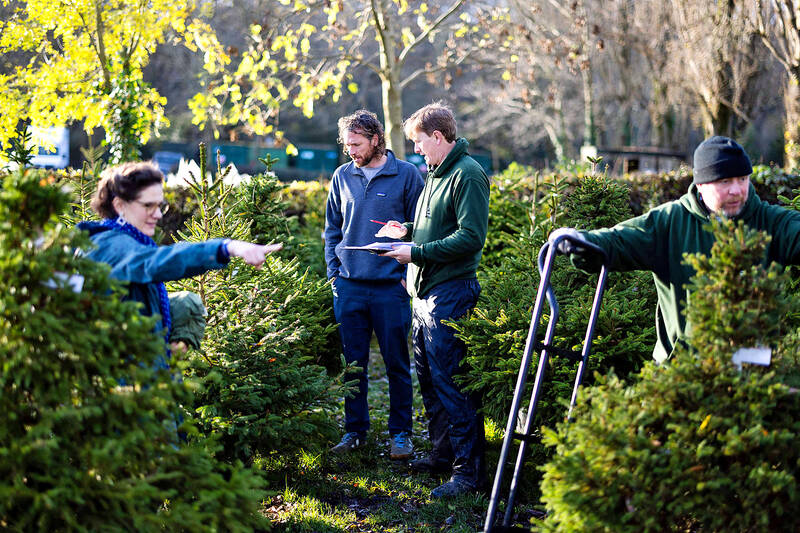On a crisp, winter’s day at a London scout center, seasoned customers picked their way along muddy rows of Christmas trees in pots labeled with their names while newcomers pondered about which one to rent.
“It’s a big decision,” one person said.
With a rise in popularity of artificial trees for environmental reasons, Londoners who prefer a real Christmas tree can now be equally sustainable.

Photo: AFP
Instead of throwing away their tree in January, they can instead return it — having watered it in its pot over the festive season — to a new rental firm that looks after it until the following year.
“We just say it’s ‘rent, water, return.’ After Christmas, return it and we put it back into the irrigation,” London Christmas Tree Rental cofounder Jonathan Mearns said.
Mearns, who in another life was a police officer working in counter-terrorism, started the business in 2017 and now has a loyal band of customers who come back year after year.
The business uses a farm in the Cotswolds in central England, where the trees are irrigated and looked after before being returned for another Christmas.
“It started off as I think what some people would have said was a crazy idea — but it has grown over the years, and more and more people are interested in renting a Christmas tree,” he said at the center in Dulwich in south London.
“There’s big growth, big growth in it. We’re not saying we have perfect trees, what we say is we have real trees,” he said.
Publishing worker Jess Sacco and doctor Rachel Gordon Boyd, both in their mid-thirties, said the green aspect of renting a tree is appealing.
“We’re trying to be more sustainable in general I guess in our lives... we thought it’s just a nice alternative to buying a tree and throwing it away,” Sacco said.
Mearns says he finds it dispiriting every January to see so many lifeless brown trees abandoned and destined to decompose.
“You will see on the streets of London in January or anywhere around the country, there will be lots of cut trees strewn on the roadside. Now those trees are dead, once they’re cut they’re dead, recovering them is impossible,” Mearns said.
The entrepreneur and motivational speaker, who says he is on a mission to reduce waste at Christmas, says that a 1m tree from his company could be a 1.3m next year.
The idea has tapped into Londoners’ concerns about the amount they throw away and adopting a sustainable lifestyle.
“Because there’s so much waste that goes on with chucking them every year. I wanted to have a real Christmas tree, but something more sustainable,” 36-year-old policy manager Joe Potter said. “It’s something that’s on our mind a lot as a family.”

UNCERTAINTY: Innolux activated a stringent supply chain management mechanism, as it did during the COVID-19 pandemic, to ensure optimal inventory levels for customers Flat-panel display makers AUO Corp (友達) and Innolux Corp (群創) yesterday said that about 12 to 20 percent of their display business is at risk of potential US tariffs and that they would relocate production or shipment destinations to mitigate the levies’ effects. US tariffs would have a direct impact of US$200 million on AUO’s revenue, company chairman Paul Peng (彭雙浪) told reporters on the sidelines of the Touch Taiwan trade show in Taipei yesterday. That would make up about 12 percent of the company’s overall revenue. To cope with the tariff uncertainty, AUO plans to allocate its production to manufacturing facilities in

TAKING STOCK: A Taiwanese cookware firm in Vietnam urged customers to assess inventory or place orders early so shipments can reach the US while tariffs are paused Taiwanese businesses in Vietnam are exploring alternatives after the White House imposed a 46 percent import duty on Vietnamese goods, following US President Donald Trump’s announcement of “reciprocal” tariffs on the US’ trading partners. Lo Shih-liang (羅世良), chairman of Brico Industry Co (裕茂工業), a Taiwanese company that manufactures cast iron cookware and stove components in Vietnam, said that more than 40 percent of his business was tied to the US market, describing the constant US policy shifts as an emotional roller coaster. “I work during the day and stay up all night watching the news. I’ve been following US news until 3am

COLLABORATION: Given Taiwan’s key position in global supply chains, the US firm is discussing strategies with local partners and clients to deal with global uncertainties Advanced Micro Devices Inc (AMD) yesterday said it is meeting with local ecosystem partners, including Taiwan Semiconductor Manufacturing Co (TSMC, 台積電), to discuss strategies, including long-term manufacturing, to navigate uncertainties such as US tariffs, as Taiwan occupies an important position in global supply chains. AMD chief executive officer Lisa Su (蘇姿丰) told reporters that Taiwan is an important part of the chip designer’s ecosystem and she is discussing with partners and customers in Taiwan to forge strong collaborations on different areas during this critical period. AMD has just become the first artificial-intelligence (AI) server chip customer of TSMC to utilize its advanced

Six years ago, LVMH’s billionaire CEO Bernard Arnault and US President Donald Trump cut the blue ribbon on a factory in rural Texas that would make designer handbags for Louis Vuitton, one of the world’s best-known luxury brands. However, since the high-profile opening, the factory has faced a host of problems limiting production, 11 former Louis Vuitton employees said. The site has consistently ranked among the worst-performing for Louis Vuitton globally, “significantly” underperforming other facilities, said three former Louis Vuitton workers and a senior industry source, who cited internal rankings shared with staff. The plant’s problems — which have not